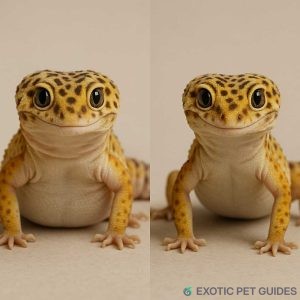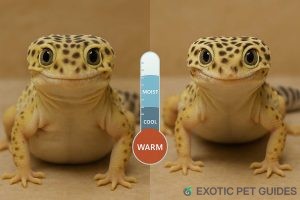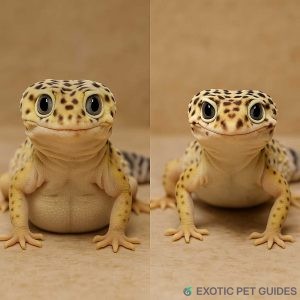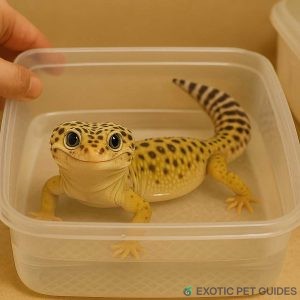🦎 Introduction
Impaction is one of the most serious health issues a leopard or crested gecko can face. It occurs when a blockage forms in the digestive tract, preventing the gecko from pooping—and eventually, from eating, moving, or even surviving.
In this article, you’ll learn:
- What causes impaction
- Early symptoms to watch for
- How to treat it at home
- When to call a vet
- How to prevent it completely

⚠️ What Is Impaction in Geckos?
Impaction means a solid blockage inside the gecko’s digestive system—like undigested substrate, oversized insects, or even shed skin.
If left untreated, it can lead to:
- Internal injury
- Paralysis of hind limbs
- Death
❗ Common Causes of Impaction
1. Loose Substrate (especially sand)
- Calci-sand, play sand, and even coconut fiber are often swallowed during feeding
- Sand clumps and cannot be digested
✅ Use solid substrates like tile, reptile carpet, or paper towels.
2. Oversized Insects
- Insects that are too large (wider than the space between the gecko’s eyes) can get stuck in the gut
✅ Rule: Feed bugs no bigger than the space between their eyes
3. Low Tank Temperatures
- Without proper heat, geckos can’t digest food efficiently, leading to constipation and blockages
✅ Warm hide should be 88–92°F (31–33°C)

4. Dehydration
- Without enough water, stool becomes hard and dry, increasing blockage risk
✅ Always provide a shallow water dish
✅ Add juicy feeders like hornworms or silkworms
🩺 Symptoms of Impaction
- No poop for 4+ days
- Swollen or firm belly
- Loss of appetite
- Lethargy or hiding
- Dragging back legs (severe)

🛠️ Home Treatment (For Mild Cases)
✅ Step-by-step:
- Soak gecko in warm shallow water (90–95°F) for 15–20 minutes
- Gently massage belly in circular motion
- Keep warm tank temps overnight
- Offer soft feeders like waxworms or mashed pumpkin
- Monitor for poop within 24–48 hours

🧑⚕️ When to See a Vet
Seek vet help immediately if:
- No poop after 48 hours of home care
- Gecko appears in pain or limp
- Dragging legs or tail
- Visible prolapse or blood
An exotic vet may use:
- Laxatives
- Injections
- Surgery (for severe impactions)
🛡️ How to Prevent Impaction
- ❌ No sand or loose substrate
- ✅ Feed appropriately sized insects
- ✅ Maintain correct tank temperature
- ✅ Gut-load and hydrate feeders
- ✅ Provide regular hydration
- ✅ Keep feeding area clear of debris
🐾 Conclusion
Impaction is scary—but entirely preventable. The key is proper substrate, heat, and insect size. If your gecko stops pooping or eating, act quickly with home care—or consult a vet to avoid long-term harm.
Your gecko’s tail should be fat, belly soft, and poop regular. Anything else = a warning.